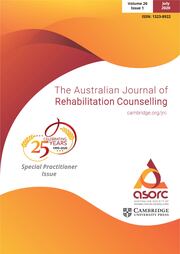Crossref Citations
This article has been cited by the following publications. This list is generated based on data provided by
Crossref.
Navidian, Ali
Rostami, Zahra
and
Rozbehani, Nasrin
2015.
Effect of motivational group interviewing-based safety education on Workers’ safety behaviors in glass manufacturing.
BMC Public Health,
Vol. 15,
Issue. 1,
Crisp, Ross
2015.
Can Motivational Interviewing be Truly Integrated with Person-centered Counselling?.
The Australian Journal of Rehabilitation Counselling,
Vol. 21,
Issue. 1,
p.
77.
O'Brien, Rachel
2017.
I want to work: A vocational rehabilitation case study following a brachial plexus injury.
International Journal of Therapy and Rehabilitation,
Vol. 24,
Issue. 1,
p.
40.
Ståhl, Christian
and
Gustavsson, Maria
2018.
Introducing Motivational Interviewing in a Sickness Insurance Context: Translation and Implementation Challenges.
Journal of Occupational Rehabilitation,
Vol. 28,
Issue. 2,
p.
357.
Britt, Eileen
Sawatzky, Roxanne
and
Swibaker, Kevin
2018.
Motivational Interviewing to Promote Employment.
Journal of Employment Counseling,
Vol. 55,
Issue. 4,
p.
176.
Aasdahl, Lene
Foldal, Vegard Stolsmo
Standal, Martin Inge
Hagen, Roger
Johnsen, Roar
Solbjør, Marit
Fimland, Marius Steiro
Fossen, Heidi
Jensen, Chris
Bagøien, Gunnhild
Halsteinli, Vidar
and
Fors, Egil Andreas
2018.
Motivational interviewing in long-term sickness absence: study protocol of a randomized controlled trial followed by qualitative and economic studies.
BMC Public Health,
Vol. 18,
Issue. 1,
McDonnall, Michele C.
and
Cmar, Jennifer
2019.
Employment Outcomes and Job Quality of Vocational Rehabilitation Consumers With Deaf-Blindness.
Rehabilitation Counseling Bulletin,
Vol. 63,
Issue. 1,
p.
13.
Hagger, Martin S.
Cameron, Linda D.
Hamilton, Kyra
Hankonen, Nelli
and
Lintunen, Taru
2020.
The Handbook of Behavior Change.
Berman, Anne H.
Beckman, Maria
and
Lindqvist, Helena
2020.
The Handbook of Behavior Change.
p.
661.
Foldal, Vegard Stolsmo
Standal, Martin Inge
Aasdahl, Lene
Hagen, Roger
Bagøien, Gunnhild
Fors, Egil Andreas
Johnsen, Roar
and
Solbjør, Marit
2020.
Sick-listed workers’ experiences with motivational interviewing in the return to work process: a qualitative interview study.
BMC Public Health,
Vol. 20,
Issue. 1,
Øiestad, Britt Elin
Aanesen, Fiona
Løchting, Ida
Storheim, Kjersti
Tingulstad, Alexander
Rysstad, Tarjei L.
Småstuen, Milada C.
Tveter, Anne Therese
Sowden, Gail
Wynne-Jones, Gwenllian
Fors, Egil A.
van Tulder, Maurits
Berg, Rigmor C.
Foster, Nadine E.
and
Grotle, Margreth
2020.
Study protocol for a randomized controlled trial of the effectiveness of adding motivational interviewing or stratified vocational advice intervention to usual case management on return to work for people with musculoskeletal disorders. The MI-NAV study.
BMC Musculoskeletal Disorders,
Vol. 21,
Issue. 1,
Aanesen, Fiona
Berg, Rigmor
Løchting, Ida
Tingulstad, Alexander
Eik, Hedda
Storheim, Kjersti
Grotle, Margreth
and
Øiestad, Britt Elin
2021.
Motivational Interviewing and Return to Work for People with Musculoskeletal Disorders: A Systematic Mapping Review.
Journal of Occupational Rehabilitation,
Vol. 31,
Issue. 1,
p.
63.
Xie, Tao
Liu, Ruobin
Chen, Yijin
and
Liu, Geping
2021.
MOCA: A Motivational Online Conversational Agent for Improving Student Engagement in Collaborative Learning.
IEEE Transactions on Learning Technologies,
Vol. 14,
Issue. 5,
p.
653.
Foldal, Vegard Stolsmo
Solbjør, Marit
Standal, Martin Inge
Fors, Egil Andreas
Hagen, Roger
Bagøien, Gunnhild
Johnsen, Roar
Hara, Karen Walseth
Fossen, Heidi
Løchting, Ida
Eik, Hedda
Grotle, Margreth
and
Aasdahl, Lene
2021.
Barriers and Facilitators for Implementing Motivational Interviewing as a Return to Work Intervention in a Norwegian Social Insurance Setting: A Mixed Methods Process Evaluation.
Journal of Occupational Rehabilitation,
Vol. 31,
Issue. 4,
p.
785.
Vanovenberghe, Charlotte
Van den Broeck, Anja
Bois, Marc Du
Schryver, Maarten De
and
Lauwerier, Emelien
2023.
A pilot randomized controlled trial on motivational interviewing in return to work after work disability.
Patient Education and Counseling,
Vol. 106,
Issue. ,
p.
98.
Cashin, Aidan G
Øiestad, Britt Elin
Aanesen, Fiona
Storheim, Kjersti
Tingulstad, Alexander
Rysstad, Tarjei Langseth
Lee, Hopin
McAuley, James H
Sowden, Gail
Wynne-Jones, Gwenllian
Tveter, Anne Therese
and
Grotle, Margreth
2023.
Mechanisms of vocational interventions for return to work from musculoskeletal conditions: a mediation analysis of the MI-NAV trial.
Occupational and Environmental Medicine,
Vol. 80,
Issue. 5,
p.
246.
Palumbo, Rocco
Hinna, Alessandro
and
Fakhar Manesh, Mohammad
2023.
Aiming at inclusive workplaces: A bibliometric and interpretive review at the crossroads of disability management and human resource management.
Journal of Management & Organization,
p.
1.
Cloth, Allison H.
Trach, Jessica
and
Cannon, Joanna E.
2023.
Needs-Based Mentoring in Schools: A Holistic Approach for Working with Youth at-Risk.
Child & Youth Services,
p.
1.
Britt, Eileen
Soleymani, Sara
Wallace‐Bell, Mark
and
Garland, Anna
2023.
Motivational interviewing for employment: An exploration of practitioner skill and client change talk.
Journal of Employment Counseling,
Vol. 60,
Issue. 1,
p.
42.




